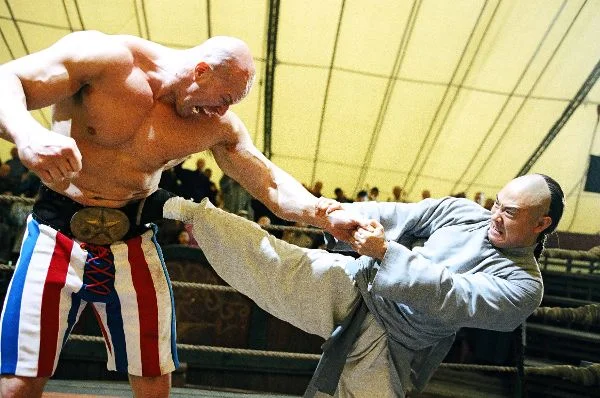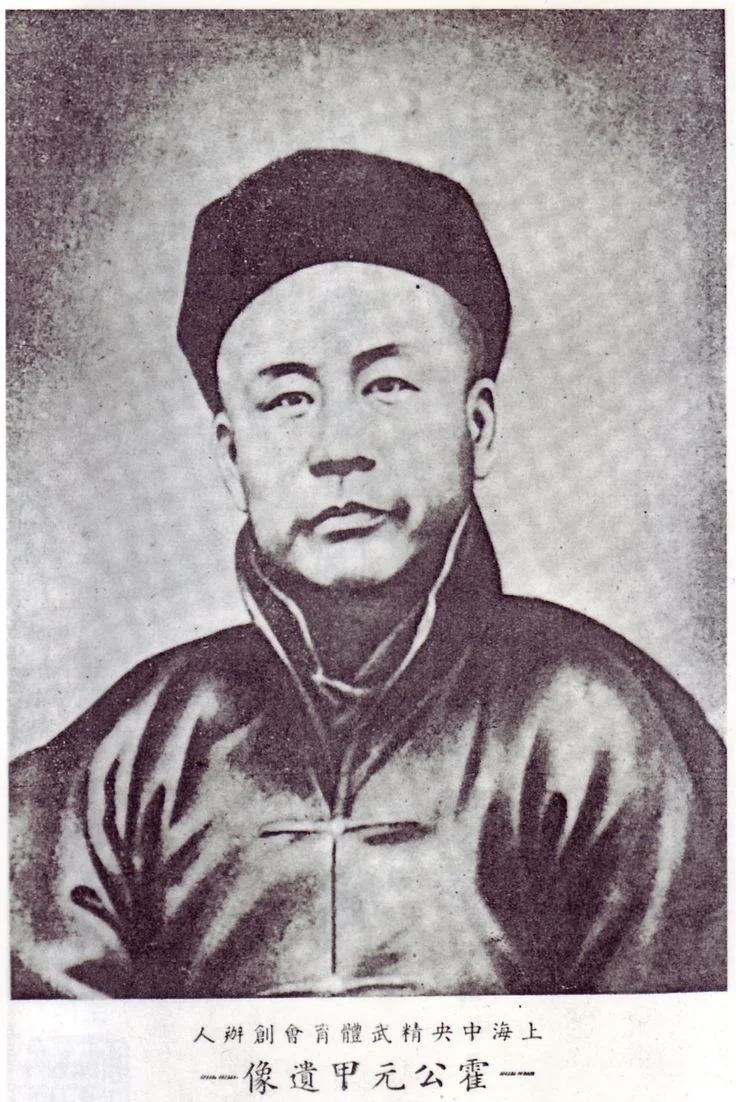I just finished the movie Fearless (霍元甲) Jet Li’s self-proclaimed final wushu film. The movie itself is not bad (Not that I’m much of a movie critic). It’s about equal parts Fists of Fury and Rocky IV (compare the final fight scenes) with a dash of Raging Bull and an inexplicable Dances with Wolves second act. I like wushu movies and this as good as any, I guess. I can also see why it was so popular in China. The sight of the lithe and deadly-looking Jet Li beating the crap out of a giant white guy (in this case Aussie professional wrestler Nathan Jones) wearing red, white, and blue shorts must be as satisfying for the average Chinese teenage male as it was for my young punk ass to watch American Hero Rocky Balboa beat down the steroid-pumped Ruskie, Ivan Drago, back in 1985.
*****************************************
A quick spoiler alert: Most Chinese are familiar with the story of Huo Yuanjia and so know the basic plot of the movie. If you don't know the story and don't want to know what happens, you might want to stop reading here.
*****************************************
The movie is loosely based (sometimes VERY loosely) on the life of Huo Yuanjia 霍元甲 (1860-1910), one of China’s most famous martial artists. Much has been made of the liberties taken with the life of the real Huo Yuanjia in making this film and one of Huo’s descendants, Huo Shoujin, even filed a lawsuit against Jet Li himself trying to block its distribution. Huo’s family were angered by scenes showing the famous hero callously killing his opponents and annoyed that in the movie Huo’s whole family is killed off as revenge for his actions. (I could see why this might be disconcerting to his grandkids.) The plaintiffs also charged that the movie depicts Huo Yuanjia as growing up in an upper-class household with servants when in reality Huo’s family made their living by farming.
With so much creative license taken, what is the story of the real Huo Yuanjia? Huo is most famous for challenging foreign fighters at a time when China herself was under threat of 'being carved up like a melon' by the imperialist powers. Whether or not those foreign fighters ever stepped into the ring with Huo is perhaps less important than Huo as a symbol, both in the early 20th century as well as today, of Chinese patriotism and nationalism.
Huo was born in 1868, the middle of three brothers in the village of Xiaonanhe which is today part of the Tianjin municipality. His father Huo Endi (霍恩第) practiced a style of fighting known as Mizongquan 秘宗拳 (later the style became known as Mizongyi 秘宗义) and earned a living as a farmer and occasional hired goon for the caravan trade.
Young Huo Yuanjia was sickly as a boy (in the movie, he has asthma) and so his father refused to train him in the martial arts. As in the movie, Huo Yuanjia watched in secret and soon became quite adept. Promising his father he would not take part in any competitions (a promise he would eventually break), his father agreed to train him and in no time Huo Yuanjia surpassed both of his brothers in skill.
In 1890, Huo won his first well-known bout, subduing a traveling wushu fighter named Du who had come to challenge the Huo family in combat. Yuanjia’s victory over Du made Huo's reputation as a daring young fighter. Soon after, like a lot of other young men at the time, Huo Yuanjia migrated to the city. In Tianjin, he participated in organized fights and did a variety of odd jobs including warehouseman and bill collector (read: house thug) for a promising young Tianjin merchant named Nong Jinsun (农劲荪) who dealt in herbs and Chinese medicines. Nong and Huo were to form a lifetime friendship.
It was also about this time that Huo met his most famous disciple, Liu Zhensheng (刘振声 who is seen briefly in the movie) and had his first brush, of sorts, with national politics.
After the failure of the 100 Days reform in 1898, one of the leading figures of the movement, Tan Sitong (谭嗣同) was executed and his head put on display. One of Tan’s friends was a Muslim merchant and martial arts expert in Beijing named Wang Zhengyi (王正宜) also known by his nickname Dadaowangwu 大刀王五 or Broadsword King #5. (He was the fifth son in his family and his favorite weapon was, well you know…) After Tan's execution, Wang fled Beijing and ended up in Tianjin where he and Huo took an immediate liking to one another. According to legend, Huo even helped Wang sneak back into Beijing to steal Tan’s head so that the famous reformer could be buried properly. Wang Zhengyi later would join the forces of the Boxer Rebellion and be killed in Beijing fighting the Allied Forces 八国联军 in 1900.
Meanwhile, Huo’s fame spread. In 1901, a Russian strongman was making the rounds in Tianjin, challenging Chinese fighters and calling the Chinese “The sick men of Asia.” According to legend, when no other Chinese fighter would answer the Russian's challenge, Huo stepped up and accepted the fight. The Russian then allegedly backed out claiming to be only a showman. The Russian was asked -- and apparently agreed -- to write a letter to the Tianjin newspaper retracting his claims slandering the Chinese people though I haven’t been able to find a copy or record of this letter so far.
In 1909, another foreign fighter, the English boxer Hercules O’Brien, put an advertisement in the Shanghai newspapers insulting the Chinese as weak. Huo asked his friends to go to Shanghai and arrange a fight. After considerable negotiations (O’Brien wanted only punches above the waist and no kicking), the terms of the fight were settled. According to most of the accounts I have read, O’Brien grew so concerned about Huo’s fearsome reputation that he ended up fleeing the country and apparently the fight never took place.
Huo capitalized on his fame and with the help of investors, including his old friend Nong Jinsun, established his legacy: the Jing Wu Athletic Society. (精武体操学校 later changed to 精武体育会) He attracted many students as well as the attention of some of China’s leading figures. Sun Yat-sen (孙中山) himself praised the school and said, regarding the Jing Wu Society, “To make a country strong, everyone must practice the martial arts.” (欲使国强,非人人习武不可) Dr. Sun even graced the school with his calligraphy (such as it was) inscribing the words for martial spirit (尚武精神) and giving it as a gift to the club.
Huo Yuanjia died relatively young, and his death is surrounded by myth and mystery. According to the story told by Huo’s descendants, the Japanese Judo Association came to Huo Yuanjia’s school to ask for a competition. A disciple of Huo disciples broke the arm of one of the association leaders. After that, the Japanese nursed a grudge against Huo but feigned friendship. When Huo became ill, they took him to a Japanese doctor who then poisoned Huo.
Other sources say that it was Huo who, in competition, defeated the head of the Japanese Judo association. At the banquet that night, Huo suddenly became ill, violently coughing. Huo was taken to a Japanese hospital where he was given, allegedly on purpose, the wrong medicine. He then died a short time later.
Like a lot of famous figures whose lives become encrusted by myth and legend, we might never know the actual truth. Huo apparently suffered from some kind of respiratory problem most of his life and it is not impossible that this might also have led to his death especially after nearly two decades in competitive fighting. Nevertheless, the story of the Japanese treacherously poisoning China’s most patriotic wushu champion persists and a version of the story, again with considerable creative license, figures prominently in the new movie as well.
After Huo's death, the leadership of the Jing Wu Association passed to Huo’s younger brother, Huo Yuanqing (霍元卿), and Huo Yuanjia’s second son, Huo Dong’ge(霍东阁). After his death, the Jing Wu School spread throughout China and the world. In the movie, Huo’s family is killed as a result of his reckless actions. In reality, Huo was survived by two sons: the aforementioned Huo Dong’ge and Huo Dongzhang (霍东章).
What interests me most about Huo Yuanjia's story is what Huo meant to the Chinese people of his day. How did the stories of Huo challenging the foreign fighters fit within the context of the times? What sort of symbol was he to those who saw a brighter future for China, a future free of foreign domination? The Qing dynasty was in its last few years and as the empire crumbled, foreign powers from Europe and elsewhere began plotting how best to carve up the remains. At the same time, it was also an age of considerable revolutionary fervor, even optimism, and the beginnings of a great quest for national identity.
Writers such as Liang Qichao 梁启超 and Yan Fu 严复 began asking important questions about China's past and future. What did it mean to be Chinese in the 'modern' world? How could China become a powerful, wealthy, and independent nation? In many ways, these are questions that China is still asking at the turn of this, the 21st century. Perhaps that is why the stories of Huo Yuanjia, the great wushu patriot, still have such currency nearly 100 years after his death.
-------------------------
References and Sources
告诉你真实的霍元甲 in 国际先驱导报 July 17, 2006
both photographs are of Huo Yuanjia, dates unknown.




